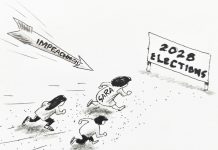When acting Davao City mayor Baste Duterte made a challenge to a fistfight with PNP Chief Gen. Nicolas Torre after police raids at Davao cockpits, not just his fists furled in wrath struck, it was a slap on the face of public office. What otherwise has been a space for service and sense becomes the space for boyish fistfights. When senior leaders yelp and snap at one another publicly like rabid canines, we must wonder: Where is professionalism?
It’s a national shame, watching men in positions of authority turn the government into a sandbox of hurt feelings. These are not backyard bullies swapping insults over marbles and pilfered snacks—they are government officials, sworn to duty, paid on the public dime, and entrusted with lives. And yet there they are, playing out gladiators in a cockfight, depriving their offices of tact and decency. The distinction between public duty and private vengeance has been so blurred by now that it is a smear.
What’s most maddening about this testosterone theater is the complete banality with which it is treated. It’s mocked by some, applauded by others, as if they’re watching a pay-per-view. But we, the audience, are victims as well. A minute spent on these ego battles is a minute lost from working on real issues—poverty, hunger, injustice, crime. Leadership is now a performance art, and unfortunately, it’s not spectacular or compelling.
The reality is that there has been too much politicking that has consumed the substance of public service. What had been an elevated calling has become a game of who can create the most thunderous applause, who can deliver the best put-down, and who gets blood first. Policies are set aside for showboating, and merit is bargained for clout. Everyone is campaigning for something—power, reelection, revenge. Those were the days when statesmanship was about restraint and quiet determination. Now it’s who appears tougher, meaner, and less forgiving.
Observe how these encounters are presented—not as intellectual debates, but as pride squabbles. When the two engaged in their run-ins, there was no reference to policies, no discussion of police tactics or ordinances. Only name-calling, chest-thumping, and an open call to duke it out in public. It’s pitiful. Government is now a circus, and these men are not ringmasters—they’re clowns who have lost sight of who the audience is.
And what does that say to young people, the next leaders who are watching this go on from the sidelines? That government is a macho world, that power must be fought for with fists, not with facts? The decline in public trust does not come quickly. It begins with moments such as these—moments when the leaders make their pride more important than their duties, their hurts more important than their people.
Better still, this is not a one-off. Political disagreements here are likely to spill over into physical bullying, Shakespearean exit tirades, and burned-earth rants. From Senate hearings turning into shouting matches to provincial governors slapping detractors in open daylight, our democracy is afflicted by an infantilism epidemic. Decency has abandoned the field. Statesmanship is in hiding.
If anything can be salvaged, it begins with a reminder to public officials what precisely “public” entails. The people didn’t elect generals and mayors to engage in a duel of attempting to outdo one another. They were given the responsibility of improving lives, of making them safer, more decent. The solution isn’t to condone immaturity with contempt, however, but to demand better: more reason, less rage; more service, less show. Leadership is not considered who can throw the first punch, but who puts the people first.




